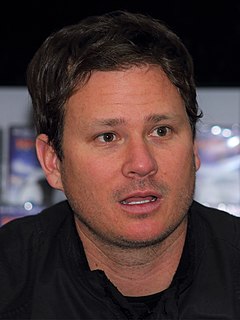A Quote by Tom DeLonge
Every day, I read books on philosophy and science fiction and human consciousness.
Related Quotes
I would say that most of my books are contemporary realistic fiction... a couple, maybe three, fall into the 'historic fiction' category. Science fiction is not a favorite genre of mine, though I have greatly enjoyed some of the work of Ursula LeGuin. I haven't read much science fiction so I don't know other sci-fi authors.
I attempt to read one book every day. I don't always achieve that, especially when I'm traveling. But when I'm home, I read almost a book a day. I certainly read a minimum of two or three a week. And as a result of that, I've read over 3,000 books in areas that interest me, like consciousness and spirituality, holistic health, leadership, success, psychological awareness, therapy, etc.
I suppose that literature as it is won't die, science fiction included. But games are becoming an extremely important part of the science fiction world, including games that are adapted from books (or vice versa: books that are adapted from games). It's wonderful to have the opportunity to play and see your favorite characters on the screen, but the opportunity to read a book does not become less attractive.
Every human being has consciousness, but not every human being has the same amount. The potential for each one of us human beings is infinite consciousness. This is called supreme enlightenment, and it just needs unfolding by transcending each day. The more consciousness we have, the better life is.
I often use detective elements in my books. I love detective novels. But I also think science fiction and detective stories are very close and friendly genres, which shows in the books by Isaac Asimov, John Brunner, and Glen Cook. However, whilst even a tiny drop of science fiction may harm a detective story, a little detective element benefits science fiction. Such a strange puzzle.



































